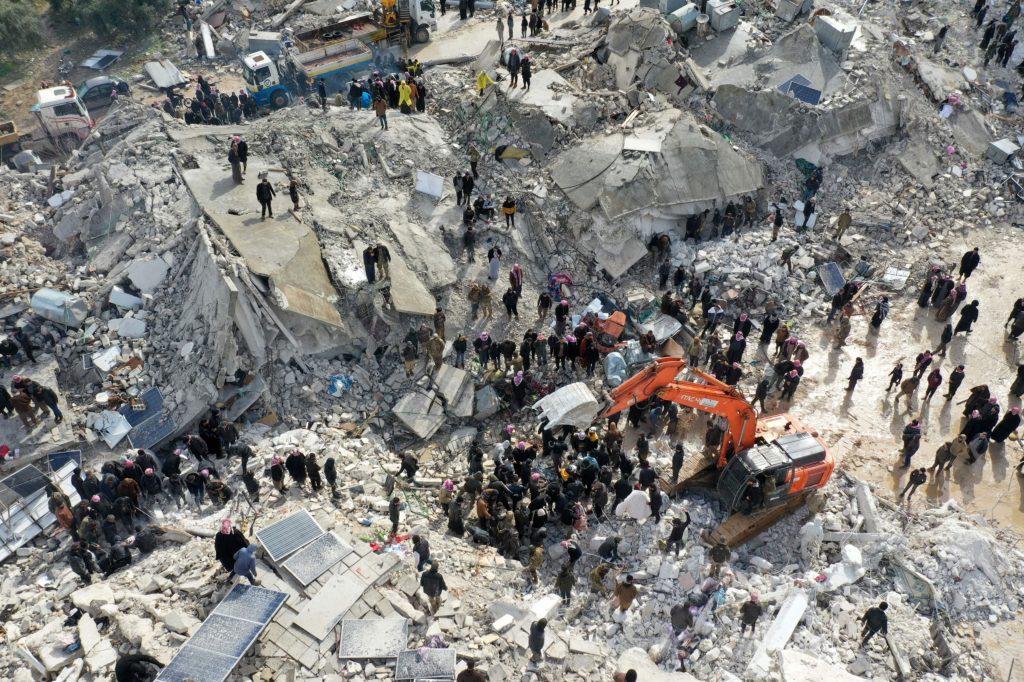Turkish President Recep Tayyip Erdogan is facing mounting criticism from earthquake survivors and opposition parties over the country’s poor construction record and what they say has been an inadequate response to one of its worst natural disasters.
A three-month state of emergency officially went into force in Turkey, enabling the government to take swift security and financial measures in areas stricken by a pair of earthquakes on Monday.
The death toll in Turkey and Syria reached 21 447, with tens of thousands still missing.
Turkish anger turns to Erdogan over weak buildings (7:04 a.m.)
With the national death toll from Monday’s two massive tremors passing 17 000 in Turkey, critics say the government’s delay in sending cranes and other heavy machinery to lift slabs of concrete missed a critical window of opportunity to save people. Experts fear tens of thousands more people are buried under the rubble, meaning the number of fatalities is likely to keep rising.
US will provide $85 million in aid (3:18 a.m.)
The US will provide $85 million in urgent humanitarian assistance to Turkey and Syria, the US Agency for International Development said in a statement. US AID is delivering emergency food and shelter for refugees and newly displaced people, winter supplies, critical health-care services, safe drinking water and sanitation assistance, according to the statement.
Secretary of State Antony Blinken and Turkish Foreign Minister Mevlut Cavusoglu discussed additional assistance the US can provide to support Turkish relief efforts, according to a readout from the state department.
Death toll surpasses 21 000 (00:40 a.m.)
The number of dead in Turkey and Syria rose to 21 447 according to the Turkish state media and the Syrian Observatory for Human Rights, which uses a network of activists on the ground. Tens of thousands of people were still missing.
The number injured in Turkey is 72 879 people, according to state-run Anadolu Agency.
Emergency rule officially goes into force (00:01 a.m.)
A three-month state of emergency officially went into force on Friday in Turkey, enabling President Erdogan to issue decrees, suspend or restrict basic rights and freedoms or take extraordinary security measures. Under emergency rule, the government can prioritize public spending to address harm caused to quake victims or commandeer money, property or labor. It also enables authorities to tap into resources of financial institutions if public funds fail to provide the financing necessary to meet urgent and vital needs in time.
Gasoline shortage (11:26 p.m.)
Turkish Defense Minister Hulusi Akar, speaking in one of the worst hit provinces of Hatay, said late Thursday that the biggest problem hampering rescue efforts in the area was a shortage of gasoline and that the government was planning to allow usage of stocks of the military, according to state-run Anadolu Agency.
World Bank aid to Turkey (10:44 p.m.)
The World Bank will provide Turkey $1.78 billion in assistance for relief and recovery work, with immediate assistance of $780 million through two existing projects in the country to rebuild basic municipal-level infrastructure. It’s also preparing an extra $1 billion in operations to support people affected.
The lender said it has started rapid damage assessment to identify priority areas for recovery and reconstruction support.
Corporate donations regulation eased (9:33 a.m.)
Capital Markets Board allowed brokerages and publicly-held companies to exceed previously set donation limits, opening way for higher donations to survivors.
© 2023 Bloomberg

